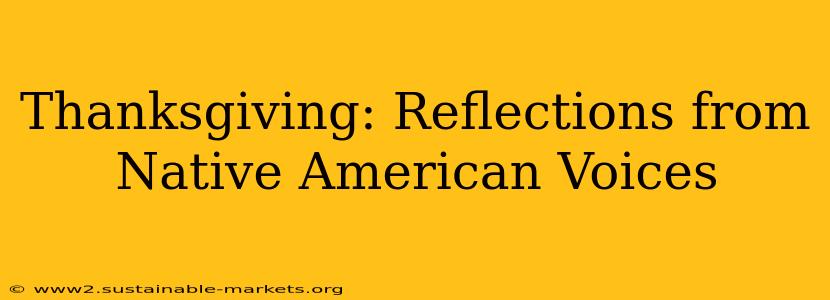Thanksgiving. For many, it conjures images of family gatherings, overflowing tables laden with turkey and pumpkin pie, and a day dedicated to gratitude. But for Native Americans, the holiday carries a far more complex and often painful history. This isn't about dismissing the traditions of gratitude and togetherness; it's about acknowledging the multifaceted narrative of this national holiday and amplifying the voices often silenced – the voices of Indigenous peoples. This article will explore the historical context of Thanksgiving, providing a glimpse into the perspectives and experiences of Native Americans, and fostering a more nuanced understanding of this significant day.
What is the true story of Thanksgiving?
The traditional narrative of the first Thanksgiving, often simplified to a harmonious feast between Pilgrims and Native Americans, significantly underrepresents the complexities of the encounter. While a harvest celebration likely occurred, the reality was far more nuanced. The Wampanoag people, who shared their knowledge and resources with the struggling Pilgrims, were ultimately subjected to displacement, disease, and violence as colonization progressed. The "peaceful" narrative often overshadows the devastating consequences of European colonization that followed, including land dispossession, forced assimilation, and the near-extinction of numerous tribes. The true story of Thanksgiving is one of survival, resilience, and ongoing struggle for self-determination.
What do Native Americans think about Thanksgiving?
There's no single, monolithic Native American perspective on Thanksgiving. Sentiments vary widely depending on tribal affiliation, individual experiences, and personal beliefs. However, a common thread running through many perspectives is a recognition of the holiday's fraught history and a call for a more accurate and inclusive understanding of its origins. For some, Thanksgiving represents a day of mourning and reflection on the historical injustices inflicted upon their ancestors. Others focus on the resilience and survival of their people, using the day as an opportunity to educate others and promote Indigenous culture and heritage. The holiday is often seen as a reminder of the ongoing struggle for land rights, self-governance, and cultural preservation.
Why is Thanksgiving a controversial holiday?
The controversy surrounding Thanksgiving stems directly from the stark contrast between the idealized narrative perpetuated in popular culture and the harsh realities faced by Native Americans during and after colonization. The sanitized version of history minimizes the brutal realities of violence, disease, and displacement that decimated Indigenous populations and led to the loss of ancestral lands. This historical inaccuracy and the subsequent perpetuation of harmful stereotypes contribute to the holiday's controversial status. Many Native Americans feel that the holiday is a painful reminder of a past marked by injustice and continues to marginalize their experiences and perspectives.
How can we celebrate Thanksgiving respectfully?
Celebrating Thanksgiving respectfully involves engaging in critical self-reflection and actively seeking to understand the historical context of the holiday. Education plays a crucial role; learning about the perspectives and experiences of Native Americans through their own voices is a vital step. This might involve reading books and articles written by Indigenous authors, supporting Native American-owned businesses, and attending events and ceremonies organized by Indigenous communities. Support organizations working to preserve Indigenous culture and advocate for their rights. Instead of focusing solely on the traditional narrative, consider incorporating a broader perspective that acknowledges the complexities and tragedies of the past, offering a more honest and inclusive reflection on this national holiday.
What are some alternative ways to celebrate Thanksgiving?
Rather than solely focusing on the traditional Thanksgiving celebration, many people are exploring alternative ways to commemorate the day that embrace a more inclusive and respectful approach. This could involve:
- Learning about Indigenous history and culture: Dedicate time to educate yourself and your family on the history and experiences of Native American communities.
- Supporting Native American-owned businesses: Shop at Native American businesses or support Indigenous artists and craftspeople.
- Participating in a National Day of Mourning: Acknowledge the National Day of Mourning, a solemn commemoration of the history and the ongoing struggles of Indigenous people.
- Focusing on gratitude for the present: Shift the focus from the historical narrative to expressing personal gratitude for the present and building a more inclusive future.
Thanksgiving offers an opportunity for reflection, not just on personal blessings, but also on the complexities of our shared history. By actively engaging with the diverse perspectives of Native Americans and challenging the simplified narratives of the past, we can move towards a more honest and inclusive understanding of this significant holiday. This requires a commitment to education, empathy, and a willingness to confront uncomfortable truths. The goal isn't to erase Thanksgiving, but to enrich its meaning by incorporating the voices and experiences of all those whose stories shape its narrative.

